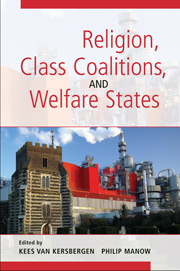Book contents
- Frontmatter
- Contents
- Preface
- List of Contributors
- 1 Religion and the Western Welfare State – The Theoretical Context
- 2 Western European Party Systems and the Religious Cleavage
- 3 The Religious Foundations of Work-Family Policies in Western Europe
- 4 Italy: A Christian Democratic or Clientelist Welfare State?
- 5 Religion and the Welfare State in the Netherlands
- 6 A Conservative Welfare State Regime without Christian Democracy? The French État-Providence, 1880–1960
- 7 Religion and the Consolidation of the Swiss Welfare State, 1848–1945
- 8 The Church as Nation? The Role of Religion in the Development of the Swedish Welfare State
- 9 The Religious Factor in U.S. Welfare State Politics
- 10 Religious Doctrines and Poor Relief: A Different Causal Pathway
- Index
10 - Religious Doctrines and Poor Relief: A Different Causal Pathway
Published online by Cambridge University Press: 28 January 2010
- Frontmatter
- Contents
- Preface
- List of Contributors
- 1 Religion and the Western Welfare State – The Theoretical Context
- 2 Western European Party Systems and the Religious Cleavage
- 3 The Religious Foundations of Work-Family Policies in Western Europe
- 4 Italy: A Christian Democratic or Clientelist Welfare State?
- 5 Religion and the Welfare State in the Netherlands
- 6 A Conservative Welfare State Regime without Christian Democracy? The French État-Providence, 1880–1960
- 7 Religion and the Consolidation of the Swiss Welfare State, 1848–1945
- 8 The Church as Nation? The Role of Religion in the Development of the Swedish Welfare State
- 9 The Religious Factor in U.S. Welfare State Politics
- 10 Religious Doctrines and Poor Relief: A Different Causal Pathway
- Index
Summary
The contributions to this volume make a comprehensive argument about how religion has helped shape the Western welfare state, aiming to supersede an older, fragmentary line of reasoning that focused on the effects of Catholic doctrine on social policy via the influence of Christian Democratic parties. This chapter adds to Manow's and van Kersbergen's (Chapter 1, this volume) account of welfare state regimes as formulas of political compromise between different electoral and societal groups by presenting evidence for a different pathway of how religion may have generated political consensus and affected the emergence of different welfare states – through the institutionalization of religious doctrines into countries' poor relief systems, and the secularization of these institutions.
Comparing how Christian social doctrines shaped poor relief in Catholic, Lutheran, and Calvinist/Reformed Protestant countries, this chapter looks at how early modern religious ideas affected the institutions of poverty policy in Europe. This perspective is compatible with, and complements, the actor-and cleavage-centered perspective advanced in the other contributions to this volume. Religion also works its way into politics by shaping a country's political tradition, and religiously rooted ideas become part of the accepted spectrum of plausible policy options. As a result, this ‘indirect’ influence channel of the religious factor may remain virtually unnoticed, and the impact of religion may be hard to detect. Still, in this chapter, I show that in the domain of poor relief there exist important institutional continuities and systematic differences between countries that are driven by the institutionalized (and secularized) principles of Catholic, Lutheran, and Calvinist social doctrines.
- Type
- Chapter
- Information
- Religion, Class Coalitions, and Welfare States , pp. 267 - 296Publisher: Cambridge University PressPrint publication year: 2009
- 38
- Cited by



